This Week in Freethought History (April 28-May 4)
Here’s your Week in Freethought History: This is more than just a calendar of events or mini-biographies – it’s a reminder that, no matter how isolated and alone we may feel at times, we as freethinkers are neither unique nor alone in the world.
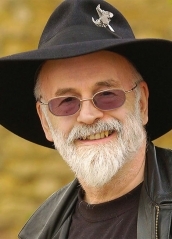 Last Sunday, April 28, but in 1948, the English author of fantasy novels, especially the Discworld series, Terry Pratchett was born. At 17, he started working as a journalist and in 1971 published his first book. Still writing part time, Pratchett published the first novel in his most famous series, Discworld, The Colour of Magic, in 1983. After finishing the fourth Discworld novel, Pratchett turned to writing full time. Discworld has sold more than 70 million copies in 37 languages. His writing has resulted in Pratchett being knighted, OBE (Order of the British Empire), in 2009. Pratchett’s novels typically cast theocrats and narrow-minded fundamentalists as villains – e.g., Vorbis in Small Gods (Discworld series, 1992) – but he says he is sympathetic to the religious impulse per se and describes himself as a “Victorian-style” atheist, in the sense that he rejects supernaturalism but considers himself culturally and morally Christian. Said Pratchett, “I think I’m probably an atheist, but rather angry with God for not existing.” In a 1999 interview he said, “I’m an atheist, at least to the extent that I don’t believe in the objective existence of any big beards in the sky. That is a religious position, by the way.” He describes himself as a humanist and is a Distinguished Supporter of the British Humanist Association and an Honorary Associate of the National Secular Society. In a 21 June 2008 article in the Daily Mail, Pratchett writes, “There is a rumour going around that I have found God. I think this is unlikely because I have enough difficulty finding my keys, and there is empirical evidence that they exist. … I don’t think I’ve found God, but I may have seen where gods come from.”
Last Sunday, April 28, but in 1948, the English author of fantasy novels, especially the Discworld series, Terry Pratchett was born. At 17, he started working as a journalist and in 1971 published his first book. Still writing part time, Pratchett published the first novel in his most famous series, Discworld, The Colour of Magic, in 1983. After finishing the fourth Discworld novel, Pratchett turned to writing full time. Discworld has sold more than 70 million copies in 37 languages. His writing has resulted in Pratchett being knighted, OBE (Order of the British Empire), in 2009. Pratchett’s novels typically cast theocrats and narrow-minded fundamentalists as villains – e.g., Vorbis in Small Gods (Discworld series, 1992) – but he says he is sympathetic to the religious impulse per se and describes himself as a “Victorian-style” atheist, in the sense that he rejects supernaturalism but considers himself culturally and morally Christian. Said Pratchett, “I think I’m probably an atheist, but rather angry with God for not existing.” In a 1999 interview he said, “I’m an atheist, at least to the extent that I don’t believe in the objective existence of any big beards in the sky. That is a religious position, by the way.” He describes himself as a humanist and is a Distinguished Supporter of the British Humanist Association and an Honorary Associate of the National Secular Society. In a 21 June 2008 article in the Daily Mail, Pratchett writes, “There is a rumour going around that I have found God. I think this is unlikely because I have enough difficulty finding my keys, and there is empirical evidence that they exist. … I don’t think I’ve found God, but I may have seen where gods come from.”
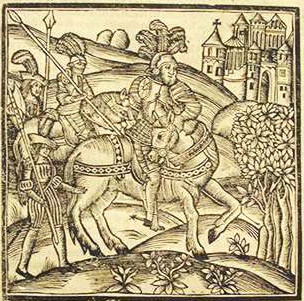 Last Monday, April 29, but in 1109, was the first Feast Day of the Abbot of the Benedictine Abbey of Cluny, Hugh of Cluny. He was born into a noble French family in 1024 and died on the 28 of April 1109, when the Benedictine Abbey of Cluny was 200 years old. The period in which Abbot Hugh lived was the beginning point of the so-called Age of Chivalry! As Thomas Bulfinch describes it, “Chivalry … framed an ideal of the heroic character, combining invincible strength and valor, justice, modesty, loyalty to superiors, courtesy to equals, compassion to weakness, and devotedness to the Church.” In fact, the next 300 years of Christendom were characterized in the noble and knightly classes (and by both sexes) as steeped in corruption, theft, violence, and every imaginable (and some unimaginable) sexual deviations, including rape, incest, pederasty, prostitution and general sexual license. This behavior was so generalized that, time and again, the contemporary chroniclers of not only France, but Spain, England and Germany complain of it. The only bad behavior that was not tolerated was infidelity to the Church!
Last Monday, April 29, but in 1109, was the first Feast Day of the Abbot of the Benedictine Abbey of Cluny, Hugh of Cluny. He was born into a noble French family in 1024 and died on the 28 of April 1109, when the Benedictine Abbey of Cluny was 200 years old. The period in which Abbot Hugh lived was the beginning point of the so-called Age of Chivalry! As Thomas Bulfinch describes it, “Chivalry … framed an ideal of the heroic character, combining invincible strength and valor, justice, modesty, loyalty to superiors, courtesy to equals, compassion to weakness, and devotedness to the Church.” In fact, the next 300 years of Christendom were characterized in the noble and knightly classes (and by both sexes) as steeped in corruption, theft, violence, and every imaginable (and some unimaginable) sexual deviations, including rape, incest, pederasty, prostitution and general sexual license. This behavior was so generalized that, time and again, the contemporary chroniclers of not only France, but Spain, England and Germany complain of it. The only bad behavior that was not tolerated was infidelity to the Church!
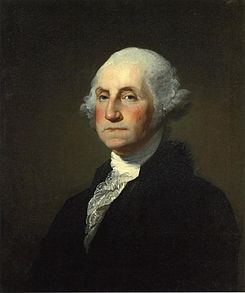 Last Tuesday, April 30, but in 1789, George Washington was inaugurated as the first President of the United States. It is significant, in light of those who would argue that the U.S. was conceived as a Christian nation, that Washington made many euphemistic references to God in his inaugural address, but never – in this address, or in any of his writings – does he make direct reference to Jesus Christ. Every contemporary who knew of his church habits agrees that Washington was never seen to accept communion, and indeed, his wife wrote that he left the church on the occasions when communion was offered. As president, Washington addressed religion with the tolerance we would expect from the leader of a religiously diverse nation. In answer to a congregation that objected to the “godless” US Constitution, Washington wrote, “The path of true piety is so plain as to require but little political direction…. In the progress of morality and science, to which our government will give every furtherance, we may confidently expect the advancement of true religion and the completion of our happiness…” – without defining true piety and true religion!
Last Tuesday, April 30, but in 1789, George Washington was inaugurated as the first President of the United States. It is significant, in light of those who would argue that the U.S. was conceived as a Christian nation, that Washington made many euphemistic references to God in his inaugural address, but never – in this address, or in any of his writings – does he make direct reference to Jesus Christ. Every contemporary who knew of his church habits agrees that Washington was never seen to accept communion, and indeed, his wife wrote that he left the church on the occasions when communion was offered. As president, Washington addressed religion with the tolerance we would expect from the leader of a religiously diverse nation. In answer to a congregation that objected to the “godless” US Constitution, Washington wrote, “The path of true piety is so plain as to require but little political direction…. In the progress of morality and science, to which our government will give every furtherance, we may confidently expect the advancement of true religion and the completion of our happiness…” – without defining true piety and true religion!
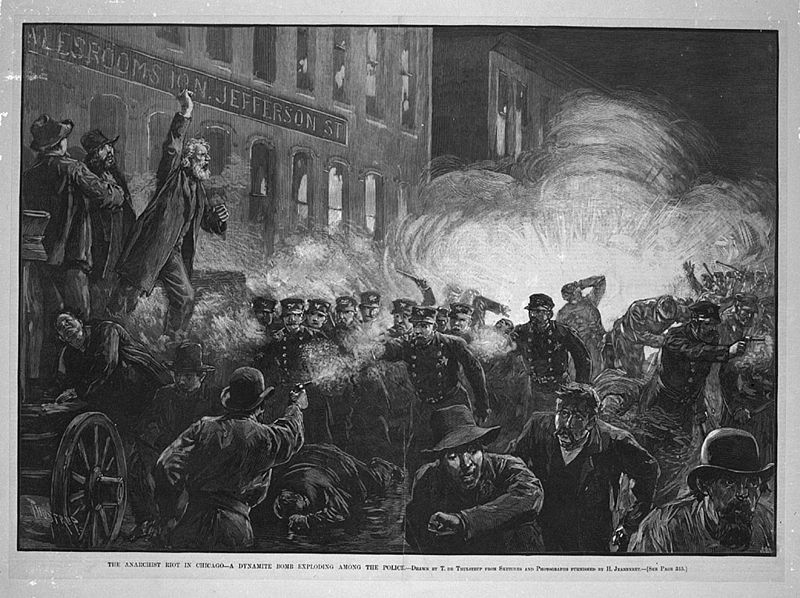 Last Wednesday, May 1, but in 1866, the first “Labor Day” was celebrated in the U.S. It is known now as May Day and no longer celebrated as a recognition of the workers who create the wealth that supports our capitalist economy. From the 13th century of the classical era, where worker protections were built into the Code of Hammurabi, to the ancient Greek and Roman colleges, which were unions for workers, the value of labor has been recognized by most advanced civilizations. When the Empire fell, the social protections built up for workers disintegrated. Only a quarter of the population in Ancient Rome were slaves, but the Christian Church saw no reason to interfere when four-fifths of workers then became agricultural serfs. This persisted from 600 to 1100. Then political and economic changes began to create a middle class between the lords and the peasants. In 1884, the Federation of Organized Trades and Labor Unions met and voted to designate May 1, 1886, as the day for a general strike to demand an 8-hour day in the U.S. The May Day strike itself was peaceful until, as the strikers over the next few days swelled to 65,000 in Chicago, and industry got nervous that workers might actually succeed, the police were called in. Someone threw a bomb among them. A riot followed and then the Haymarket Massacre ensued, in which police shot and killed several strikers and wounded 200. Without compelling evidence, eight labor leaders were arrested, and all but two were executed by hanging. The Haymarket Massacre forever tarnished May 1 as a day to celebrate labor in the US – although the day is still a holiday in at least 110 other countries!
Last Wednesday, May 1, but in 1866, the first “Labor Day” was celebrated in the U.S. It is known now as May Day and no longer celebrated as a recognition of the workers who create the wealth that supports our capitalist economy. From the 13th century of the classical era, where worker protections were built into the Code of Hammurabi, to the ancient Greek and Roman colleges, which were unions for workers, the value of labor has been recognized by most advanced civilizations. When the Empire fell, the social protections built up for workers disintegrated. Only a quarter of the population in Ancient Rome were slaves, but the Christian Church saw no reason to interfere when four-fifths of workers then became agricultural serfs. This persisted from 600 to 1100. Then political and economic changes began to create a middle class between the lords and the peasants. In 1884, the Federation of Organized Trades and Labor Unions met and voted to designate May 1, 1886, as the day for a general strike to demand an 8-hour day in the U.S. The May Day strike itself was peaceful until, as the strikers over the next few days swelled to 65,000 in Chicago, and industry got nervous that workers might actually succeed, the police were called in. Someone threw a bomb among them. A riot followed and then the Haymarket Massacre ensued, in which police shot and killed several strikers and wounded 200. Without compelling evidence, eight labor leaders were arrested, and all but two were executed by hanging. The Haymarket Massacre forever tarnished May 1 as a day to celebrate labor in the US – although the day is still a holiday in at least 110 other countries!
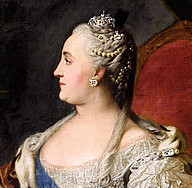 Last Thursday, May 2, but in 1729, that Catherine II of Russia, who would become Catherine the Great (Екатерина II Великая), was born. She was crowned Catherine II in 1762 – after deposing her own husband, whom she married at age 15 by political arrangement. She was well-read and selected able advisors, so Catherine proved more than suited to the task of ruling the largest empire in Europe. Her goal was to complete the Westernization of the Russian Empire that had ceased 37 years earlier at the death of another Romanov Emperor, Peter the Great (Пётр Вели́кий, 1672-1725). Empress Catherine was initially sympathetic with the French Revolution and its intellectual leadership: she corresponded with Voltaire and d'Alembert and invited Diderot to settle in Russia. A skeptic with advanced humanitarian ideals, in her letters she professed Deism and scorned the "mummeries" of the Russian Church to which she was converted. But after the peasant rising under Pugachev (1773-74), and having heard of the excesses following the French Revolution, by 1790 she became fearful of popular revolt. Catherine imposed repressive measures to achieve stability, which in turn alienated the educated in Russian society.
Last Thursday, May 2, but in 1729, that Catherine II of Russia, who would become Catherine the Great (Екатерина II Великая), was born. She was crowned Catherine II in 1762 – after deposing her own husband, whom she married at age 15 by political arrangement. She was well-read and selected able advisors, so Catherine proved more than suited to the task of ruling the largest empire in Europe. Her goal was to complete the Westernization of the Russian Empire that had ceased 37 years earlier at the death of another Romanov Emperor, Peter the Great (Пётр Вели́кий, 1672-1725). Empress Catherine was initially sympathetic with the French Revolution and its intellectual leadership: she corresponded with Voltaire and d'Alembert and invited Diderot to settle in Russia. A skeptic with advanced humanitarian ideals, in her letters she professed Deism and scorned the "mummeries" of the Russian Church to which she was converted. But after the peasant rising under Pugachev (1773-74), and having heard of the excesses following the French Revolution, by 1790 she became fearful of popular revolt. Catherine imposed repressive measures to achieve stability, which in turn alienated the educated in Russian society.
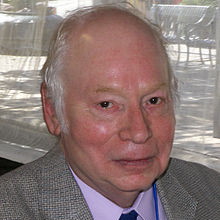 Yesterday, May 3, but in 1933, American theoretical physicist and Nobel laureate Steven Weinberg was born. Weinberg was born in New York City to Jewish immigrant parents and graduated from the Bronx High School of Science in 1950. After studying at Cornell University and abroad at the Neils Bohr Institute, he earned his Ph.D. degree in Physics in 1957 from Princeton University. In 1979, Weinberg received the Nobel in Physics for his contributions (with Abdus Salam and Sheldon Glashow) to describing the unification of the weak force and electromagnetic interaction between elementary particles. In addition to his academic work, Weinberg has been a popularize of and a strong public advocate for science. His books on science, written for a general audience, combine the history and philosophy of science with a godless view of the universe. Indeed, in a 1999 speech in Washington, DC, Weinberg quipped, “With or without religion, good people can behave well and bad people can do evil; but for good people to do evil – that takes religion.” Weinberg was the 2002 Humanist of the Year of the American Humanist Association. In a 25 September 2008 essay in the New York Review of Books, Weinberg asserts clearly that he is an atheist and, if not a “Warfare” (as A.D. White would call it), that there is a natural “tension” between religion and science. But, far from subscribing to the “God of the Gaps” thesis, he has also said, “The more the universe seems comprehensible, the more it seems pointless.” It was at the 2006 “Beyond Belief” symposium in La Jolla, California, that Steven Weinberg said, “the world needs to wake up from its long nightmare of religious belief.”
Yesterday, May 3, but in 1933, American theoretical physicist and Nobel laureate Steven Weinberg was born. Weinberg was born in New York City to Jewish immigrant parents and graduated from the Bronx High School of Science in 1950. After studying at Cornell University and abroad at the Neils Bohr Institute, he earned his Ph.D. degree in Physics in 1957 from Princeton University. In 1979, Weinberg received the Nobel in Physics for his contributions (with Abdus Salam and Sheldon Glashow) to describing the unification of the weak force and electromagnetic interaction between elementary particles. In addition to his academic work, Weinberg has been a popularize of and a strong public advocate for science. His books on science, written for a general audience, combine the history and philosophy of science with a godless view of the universe. Indeed, in a 1999 speech in Washington, DC, Weinberg quipped, “With or without religion, good people can behave well and bad people can do evil; but for good people to do evil – that takes religion.” Weinberg was the 2002 Humanist of the Year of the American Humanist Association. In a 25 September 2008 essay in the New York Review of Books, Weinberg asserts clearly that he is an atheist and, if not a “Warfare” (as A.D. White would call it), that there is a natural “tension” between religion and science. But, far from subscribing to the “God of the Gaps” thesis, he has also said, “The more the universe seems comprehensible, the more it seems pointless.” It was at the 2006 “Beyond Belief” symposium in La Jolla, California, that Steven Weinberg said, “the world needs to wake up from its long nightmare of religious belief.”
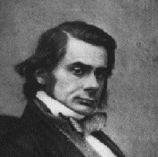 Today, May 4, but in 1825, the English biologist known as “Darwin’s Bulldog,” for his advocacy of Charles Darwin's theory of evolution, Thomas Henry Huxley was born. Largely self-educated, as a medical apprentice, Huxley signed on as assistant surgeon with the H.M.S. Rattlesnake, to chart the seas around Australia and New Guinea. It was an opportunity much like the one Darwin had aboard The Beagle, and, as with Darwin, the experience changed his life. In 1859, when Charles Darwin's On the Origin of Species was published, Huxley read it and at once remarked, “How stupid of me not to have thought of that.” He wrote to the author, “I finished your book yesterday... As for your doctrines I am prepared to go to the Stake if requisite... And as to the curs which will bark and yelp – you must recollect that some of your friends at any rate are endowed with an amount of combativeness which … may stand you in good stead – ...I am sharpening up my claws and beak in readiness.” His defense of Darwin's theories, and especially to their application to the evolution of the human species, earned him the nickname, “Darwin's Bulldog.” Huxley invented the term “agnostic” to describe his view that the mind cannot reach realities beyond the senses. He disdained Christian doctrines.
Today, May 4, but in 1825, the English biologist known as “Darwin’s Bulldog,” for his advocacy of Charles Darwin's theory of evolution, Thomas Henry Huxley was born. Largely self-educated, as a medical apprentice, Huxley signed on as assistant surgeon with the H.M.S. Rattlesnake, to chart the seas around Australia and New Guinea. It was an opportunity much like the one Darwin had aboard The Beagle, and, as with Darwin, the experience changed his life. In 1859, when Charles Darwin's On the Origin of Species was published, Huxley read it and at once remarked, “How stupid of me not to have thought of that.” He wrote to the author, “I finished your book yesterday... As for your doctrines I am prepared to go to the Stake if requisite... And as to the curs which will bark and yelp – you must recollect that some of your friends at any rate are endowed with an amount of combativeness which … may stand you in good stead – ...I am sharpening up my claws and beak in readiness.” His defense of Darwin's theories, and especially to their application to the evolution of the human species, earned him the nickname, “Darwin's Bulldog.” Huxley invented the term “agnostic” to describe his view that the mind cannot reach realities beyond the senses. He disdained Christian doctrines.
Other birthdays and events this week—
April 28: Freemasonry was condemned by Pope Clement XII (1738).
April 28: the Synod of Aachen approves a divorce, but churches hate divorce (862).
May 1: persecutor of Christians, Roman Emperor Diocletian abdicated (305 CE).
May 4: American education reformer Horace Mann was born (1769).
We can look back, but the Golden Age of Freethought is now. You can find full versions of these pages in Freethought history at the links in my blog, FreethoughtAlmanac.com.

